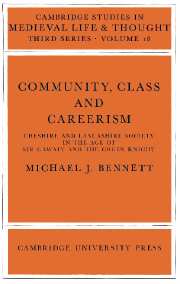Book contents
- Front Matter
- Contents
- List of maps and tables
- Acknowledgements
- Abbreviations
- Genealogical table
- Introduction
- 1 THE REGIONAL SOCIETY
- 2 THE COUNTY COMMUNITIES
- 3 LESSER SOLIDARITIES
- 4 THE POPULATION
- 5 LANDED SOCIETY
- 6 THE PEASANTRY
- 7 TOWNS, TRADE AND INDUSTRY
- 8 THE CHURCH
- 9 MILITARY SERVICE
- 10 POWER, PATRONAGE AND PROVINCIAL CULTURE
- 11 CONCLUSION
- Bibliography
- Index
7 - TOWNS, TRADE AND INDUSTRY
Published online by Cambridge University Press: 22 September 2009
- Front Matter
- Contents
- List of maps and tables
- Acknowledgements
- Abbreviations
- Genealogical table
- Introduction
- 1 THE REGIONAL SOCIETY
- 2 THE COUNTY COMMUNITIES
- 3 LESSER SOLIDARITIES
- 4 THE POPULATION
- 5 LANDED SOCIETY
- 6 THE PEASANTRY
- 7 TOWNS, TRADE AND INDUSTRY
- 8 THE CHURCH
- 9 MILITARY SERVICE
- 10 POWER, PATRONAGE AND PROVINCIAL CULTURE
- 11 CONCLUSION
- Bibliography
- Index
Summary
The pursuit of a craft or engagement in commerce perhaps represent the most elemental forms of social mobility. Almost all stable agrarian societies manage to maintain a measure of specialised commodity production and a more or less developed system of exchange. A reasonably compact, centralised and politically mature state like England in the middle ages was well placed to develop a fairly sophisticated market sector, which could both draw its strength from, and in turn further stimulate regional specialisation. While the vast majority of English tradesmen operated on a fairly localised scale, the economic integration of the nation cannot be overlooked in a study of this nature. Even the humblest chapman or artisan in the Northwest was potentially linked into a network of opportunities which embraced the entire kingdom.
Geographical mobility was in many respects a necessary preliminary to social advancement. To the commercial classes, freedom of movement was absolutely vital. Demonstrably the low-born but ambitious tradesman had first to emancipate himself from manorial discipline, and in earlier times had sought the comparative freedom of chartered towns. Furthermore, if the best opportunities were to be obtained, it was often necessary to travel to find the best markets for the particular commodity or skill to be sold. In real life as in popular myth, few enterprising men could resist the lure of London. Finally, there can be little doubt that the successful merchant found it easier to register social advancement in more distant parts.
- Type
- Chapter
- Information
- Community, Class and Careers , pp. 108 - 133Publisher: Cambridge University PressPrint publication year: 1983



